By Meetra Alokozay, Executive Director, Sahar Education
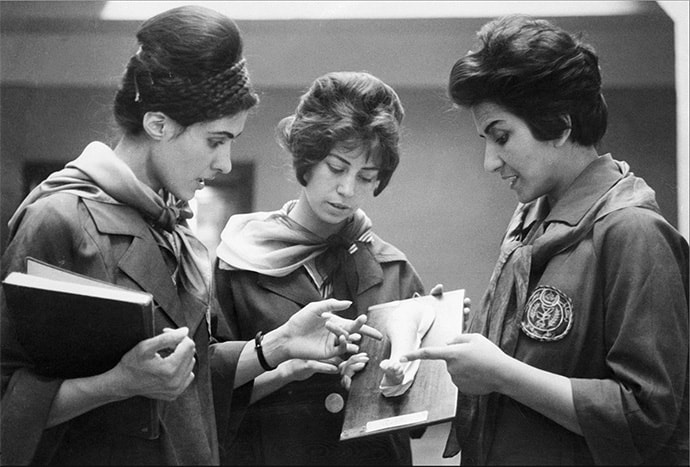
Female Kabul medical university students in 1970s
Historically, women have long borne the brunt of social, political and economic instabilities, with very little to no control over the situation. However, to be “officially” banned from a right as basic as getting an education might be unfamiliar to many. Afghanistan is the only country in the world where women are banned from getting an education, for the second time now. What is known of Afghan women are mostly from the post 9/11 narratives, none of which fully represent the gains and the losses that Afghan women have had to go through. From being able to vote in 1919, to gaining the right to equal political and social participation in the 1960s, to a total loss of right to education, employment, and participation in the social and political spheres as a result of the political unrests in the 80s and 90s.
In 1996, when the Taliban came to power for the first time, they immediately shut down all girls’ schools and barred women from all public spaces. Most girls were out of school and some attended secret schools that were created as a response to school closures. In 2001, after the US invasion, schools reopened and millions of children entered the school system—many for the first time. One-third of these students were girls. Though women were again allowed to teach and even be principals of schools, girls were still substantially under-represented among the students flooding the Afghanistan education system. Many girls in Afghanistan were far behind in their access to education due to years of Taliban rule; stigma against girls’ education, the lack of available facilities, and early marriage or motherhood kept girls from school. To address these needs, Sahar built and repaired schools mainly for girls. To improve the quality of education in girls’ schools, Sahar launched teacher training programs. In 2015, Sahar launched the pilot for the Early Marriage Prevention Program in two Afghanistan schools. As we worked with young girls and their families, the importance of working with men to achieve gender equity was reiterated to us. Hence, Sahar launched its Men as Partners in Change Program.
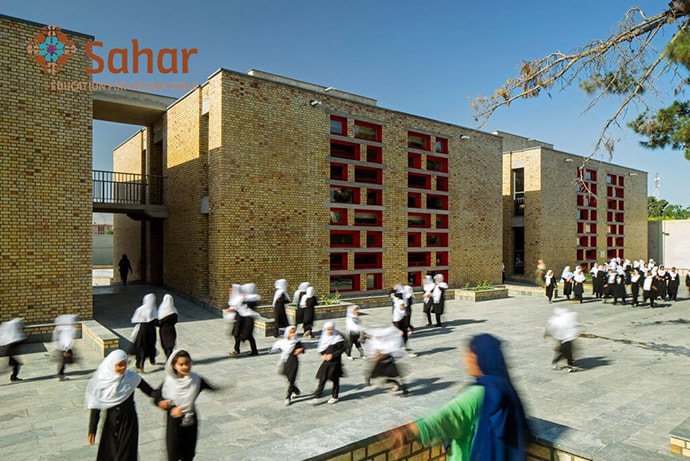
Students attending Gohar Khatoon High School built by Sahar Education. Photo: Sahar
Women and girls had, once again, made significant gains in social, political and economic affairs in the years after the Taliban were overthrown. Waves of educated Afghan women entered the workforce; doctors, engineers, architects, teachers, musicians, artists, journalists, parliamentarians, civil servants, police officers, social workers, businesswomen and so on. The social dynamics had started to change. Society had, once again, started to be more accepting of gender equality. Twenty years of hope and hard earned rights came crashing down when the Taliban rapidly made their way to Kabul and took over Afghanistan for the second time in August of 2021.
Since returning to power, Taliban leaders and their de facto regime have issued more than 30 decrees banning Afghan women from access to any education beyond grade six, employment of Afghan women in almost all sectors including national and international organizations, women traveling without a male blood relative (mahram). The ministry of women’s affairs has been dissolved. Journalists and female protesters have been detained and tortured. The economic and hunger crisis have only worsened. Women and girls in Afghanistan face systematic gender apartheid and discrimination.
While many organizations suspended or canceled operations in Afghanistan, Sahar saw the need, more than ever before, to step in. We have since pivoted slightly, however our mission to create educational opportunities in Afghanistan that empower and inspire children and their families to build peaceful, thriving communities, still remains the same. While we have paused our efforts to build girls’ schools, we partner with in-country grassroots organizations in Afghanistan to provide learning spaces and educational programs for girls and women. As the de facto Taliban regime tries to eliminate girls and women from the Afghan society and brainwash men, it is crucial to educate women about their rights and support them in their journey of self-empowerment.
Our English, Digital Literacy, and Women Empowerment programs allow us to offer a series of innovative and informative workshops and classes to support Afghan girls’ education by expanding their knowledge in various fields such as learning through technology, leadership seminars, English and computer classes as well as women’s empowerment and women’s health workshops, in Mazar-e-sharif. The goal is to provide participants with a sense of ownership and importance in designing solutions to community problems and to teach girls leadership skills, and the importance of their rights and voice. Furthermore, Afghan girls will gain English language and computer skills to help them access online education and professional platforms, which is one of the few options available for girls. In our women’s empowerment and women’s health workshops, participants learn and discuss important topics such as human rights, early marriages, leadership, domestic violence, mental health, reproductive health, and menstrual health.
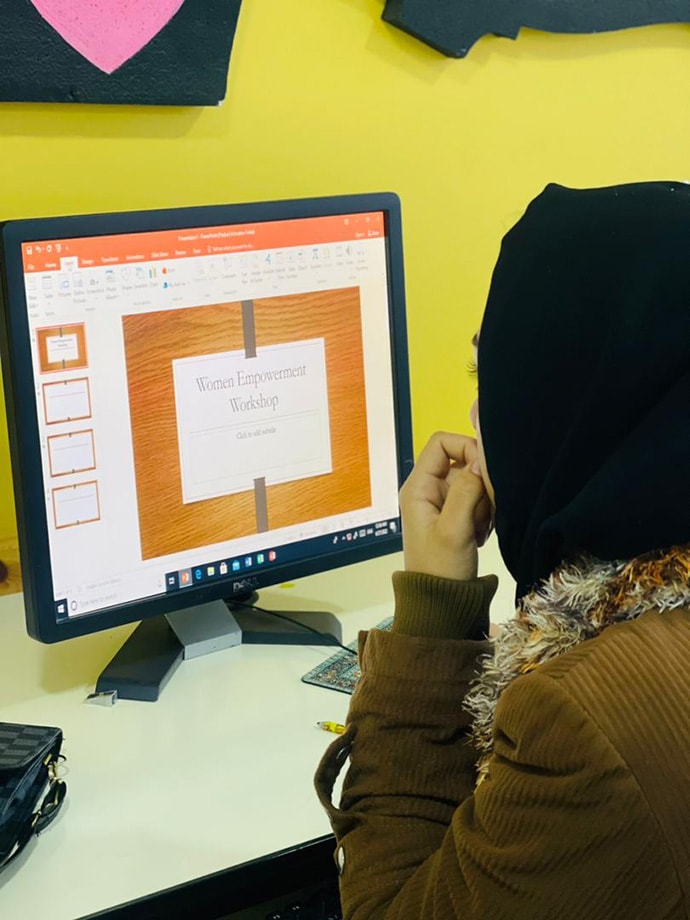
One of our students prepares a PowerPoint presentation. Photo: Sahar
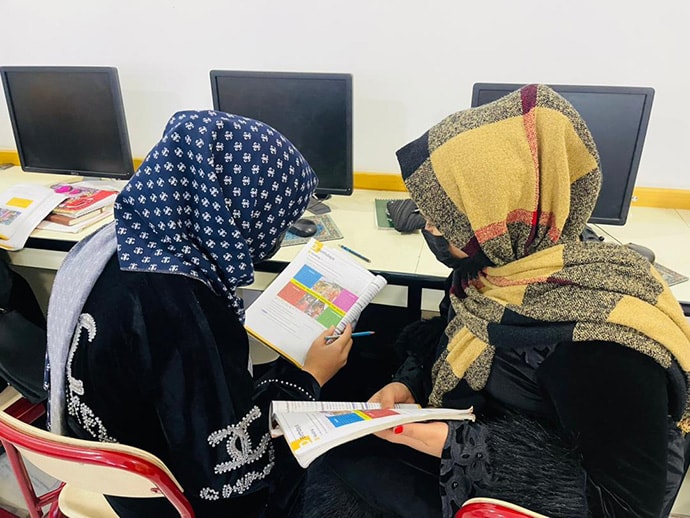
Students work together in their English language class. Photo: Sahar
Sahar recently launched its underground IT & Coding classes for girls. With the Taliban’s draconian policies and ban on girls’ education and employment, many are turning to online opportunities. Compounding this issue is the limited access to computer courses in remote areas and for economically disadvantaged students, making it challenging for them to receive basic computer skills training to access online learning platforms. Our program bridges the digital gap in Afghanistan by empowering women to learn and practice computer skills. Sahar’s IT and coding courses blend theoretical and practical lessons for hands-on experience. Courses run for three to six months and cover computer basics, MS Office, and website building. Our initiative enables girls to develop a solid foundation in these skills, preparing them for accessing online education and online employment opportunities.
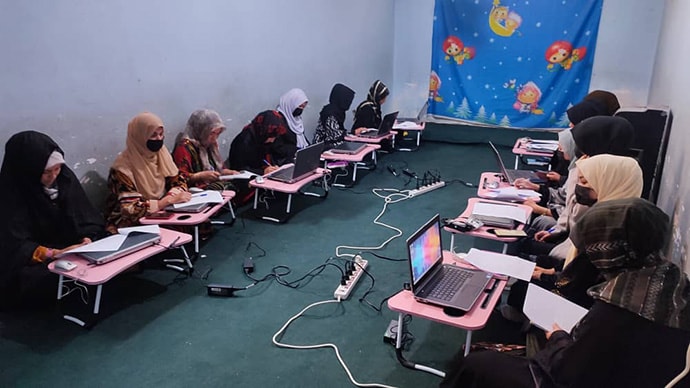
Home based IT & coding class. Photo: Sahar
To address the needs of women who have already missed the chance to receive an education, Sahar has designed basic literacy and sewing classes. The literacy and sewing project is designed for economically disadvantaged girls and women aged 18-40 who have not had the opportunity to get formal education. The program provides participants with free literacy and sewing skills classes. Additionally, we are integrating Sahar Education’s women’s leadership and health workshops in the literacy class to educate participants about important topics such as mental health, early marriage prevention, planned parenthood, and support them in their journey of self-empowerment. Besides learning how to read and write, the program aims to provide participants with the opportunity to gain skills that will lead them to become financially independent. All participants get to take their sewing machine home at the end of the program so that they not only have the skills but also the means to start their own small business. Three of our students have already started to receive orders from their relatives and neighbors.
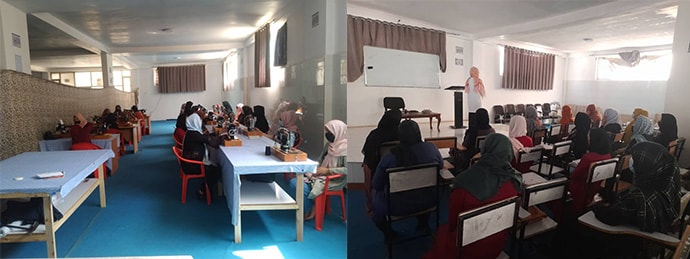
Young women get together at their sewing and literacy classes. Photo: Sahar
Additionally, Sahar is closely working with one of our partners to re-launch our Men as Partners in Change program soon.
While the times are beyond difficult and disheartening, our students continue to be our source of inspiration. The courage and resilience that they show in the face of injustice motivates us to work harder and be there for them as they pursue their journey of growth and self-empowerment. Sahar understands the importance of education in achieving gender equity, and we will continue to support our girls.
**********
By fostering interchanges between the United States and Afghanistan, Sahar builds schools and educational programs for girls in Afghanistan, empowering and inspiring children and their families to build peaceful, thriving communities. sahareducation.org